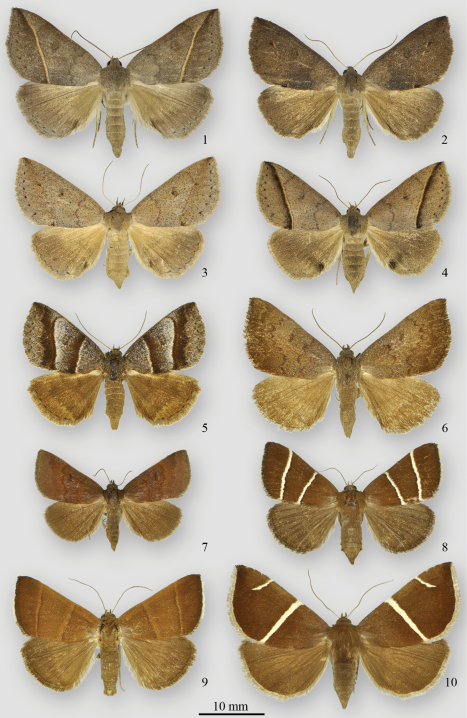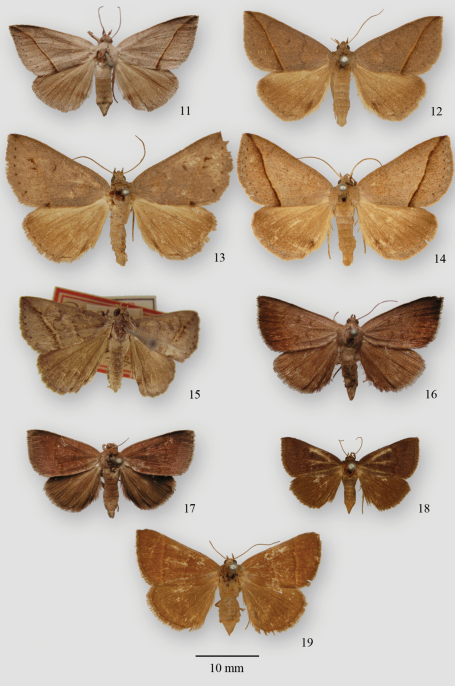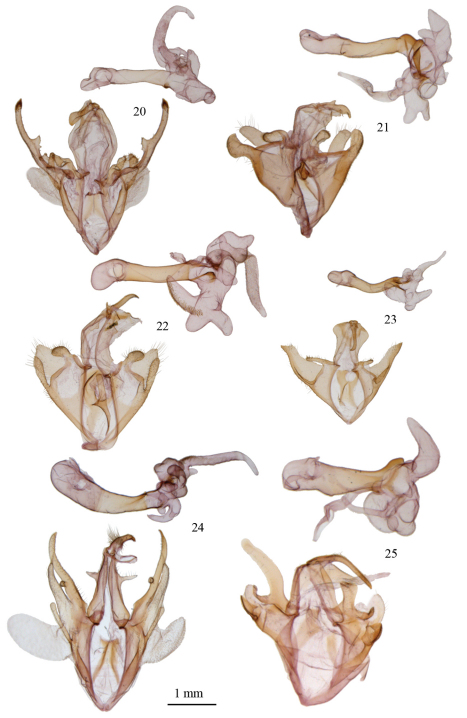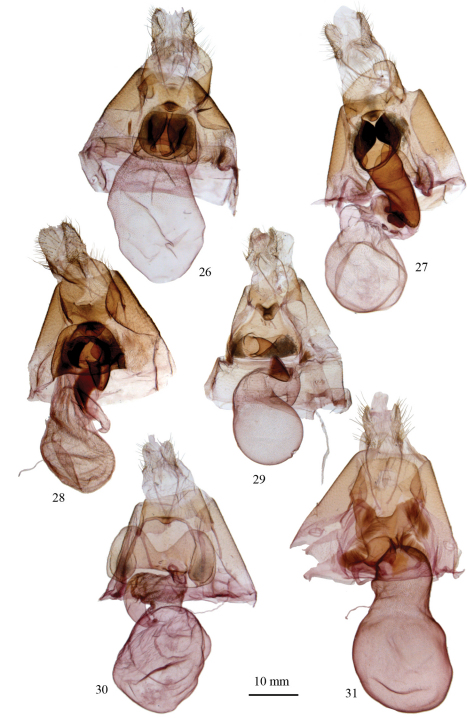Abstract Abstract
After examining the type specimens of species in the eastern North American genus Argyrostrotis the number of known species in the genus is reduced from 10 to six through synonymy. A key to species is included along with illustrations of the adults and genitalia of each species. Three Neotropical species currently included in Argyrostrotis (Argyrostrotis eurysaces Schaus, 1914; Argyrostrotis quadrata Dognin, 1910; and Celiptera surrufula Dyar, 1913) are transferred to other genera as Argyrosticta eurysaces (Schaus, 1914), comb. n. [Noctuidae: Bagisarinae], Heterochroma quadrata (Dognin, 1910), comb. n. [Noctuidae: Amphipyrinae], and Ptichodis surrufula (Dyar, 1913), comb. n. [Erebidae: Erebinae: Euclidiini].
Keywords: Argyrostrotis, Argyrosticta eurysaces, Ptichodis surrufula, Heterochroma quadrata, eastern North America
Introduction
Currently, there are 10 species of Argyrostrotis Hübner listed by Lafontaine and Schmidt (2010). An additional three species listed by Poole (1989) from Mexico and South America are transferred to other genera, thereby restricting the geographic range of the genus to eastern and central North America. Examination of the type specimens, and the published illustrations associated with the original descriptions where the types have been lost or destroyed, shows that four of the names recognized as valid species should be placed in synonymy with Argyrostrotis flavistriaria (Guenée). A key to species and adults and genitalia of each species are illustrated in order to facilitate identification.
Materials and methods
Repository abbreviations
Specimens were examined from the following collections:
AMNH
BMNH
CNC
JBS
MNHN
USNM
Dissecting methods and terminology
Dissection of genitalia and terms for genital structures and wing markings follow Lafontaine (2004).
Key to species of Argyrostrotis
| 1 | Forewing with postmedial line straight or evenly curved, usually prominent | 2 |
| – | Forewing with postmedial line dentate, usually obscure | 5 |
| 2 | Forewing with postmedial line appearing to extend to apex and usually highlighted by yellow line or spots | Argyrostrotis flavistriaria |
| – | Forewing with postmedial line subapical and without yellow shading | 3 |
| 3 | Forewing with postmedial line curved toward wing base at costa; basal, medial, and terminal areas may be extensively dusted with white scales | Argyrostrotis sylvarum |
| – | Forewing with postmedial line straight; ground color brown | 4 |
| 4 | Postmedial line complete | Argyrostrotis quadrifilaris |
| – | Postmedial line incomplete | Argyrostrotis anilis |
| 5 | Forewing length 15–17mm; fringe with white scaling | Argyrostrotis erasa |
| – | Forewing length 10–13 mm; fringe rarely with white scaling and if so, scaling minute | Argyrostrotis deleta |
Systematics
Argyrostrotis flavistriaria
(Hübner, [1831])
http://species-id.net/wiki/Argyrostrotis_flavistriaria
Figures 1–10.
Argyrostrotis adults 1–4 Argyrostrotis flavistriaria 5 Argyrostrotis sylvarum 6 Argyrostrotis erasa 7 Argyrostrotis deleta 8, 9 Argyrostrotis quadrifilaris 10 Argyrostrotis anilis.
Figures 11–19.
Type material of Argyrostrotis 11 Poaphila perplexa lectotype, MNHN 12 Poaphila perspicua holotype, BMNH 13 Mocis? diffundens holotype, BMNH 14 Phurys glans syntype, BMNH 15 Phurys carolina lectotype, AMNH 16 Poaphila erasa lectotype, MNHN 17 Poaphila deleta lectotype, MNHN 18 Poaphila placata syntype, BMNH 19 Poaphila obsoleta syntype, BMNH.
Figures 20–25.
Male genitalia of Argyrostrotis 20 Argyrostrotis flavistriaria 21 Argyrostrotis sylvarum 22 Argyrostrotis erasa 23 Argyrostrotis deleta 24 Argyrostrotis quadrifilaris 25 Argyrostrotis anilis.
Figures 26–31.
Female genitalia of Argyrostrotis. 26 Argyrostrotis flavistriaria 27 Argyrostrotis sylvarum 28 Argyrostrotis erasa 29 Argyrostrotis deleta 30 Argyrostrotis quadrifilaris 31 Argyrostrotis anilis.
Crochiphora flavistriaria Hübner, [1831]: 35, pl. [96], figs 555, 556.
Poaphila herbicola Guenée, 1852: 301, syn. n.
Poaphila contempta Guenée, 1852: 302, syn. n.
Poaphila perplexa Guenée, 1852: 302.
Poaphila perspicua Walker, 1858: 1477.
Mocis? diffundens Walker, 1858: 1491, syn. n.
Phurys glans Grote, 1876b: 416.
Phurys carolina Smith, 1905: 68, syn. n.
Type material.
The type material of Crochiphora flavistriaria is lost, but the illustrations (Hübner, 1831, pl. [96], figs 555, 556) are diagnostic and represent the form shown in Fig. 1. The type specimens of Poaphila herbicola and Poaphila contempta are lost, but the original descriptions are diagnostic and represent the forms shown in Figs 2 and 3 respectively. The female lectotype of Poaphila perplexa in the MNHN labelled “Javana [Savannah] Georgia/ perplexa/ Type/ Museum Paris/ Poaphila perplexa Gn. Vol. 7, 1852, p. 302, n=1755” is shown in Fig. 11. The male holotype of Poaphila perspicua in the BMNH labelled “Type/ Argyrostrotis perspicua.” is shown in Fig. 12 and represents the same form as the original illustration of Crochiphora flavistriaria. The male holotype of Mocis? diffundens in the BMNH labelled “Type/ 8. Mocis? diffundens.” is shown in Fig. 13. A male syntype of Phurys glans in the BMNH labelled “Type/ Grote Coll. 82-54./ 3129/ Phurys glans Grote type” is shown in Fig. 14. The male lectotype of Phurys carolina in the AMNH labelled “Phurys carolina Smith % type/ Nth Car., August”/ Coll. J.B. Smith/ Lectotype by E.L. Todd” is shown in Fig. 15.
Distribution.
North Carolina south to Florida and Texas.
Argyrostrotis sylvarum
(Guenée, 1852)
http://species-id.net/wiki/Argyrostrotis_sylvarum
Poaphila sylvarum Guenée, 1852: 300, pl 23, fig 2.
Type material.
The type material of Poaphila sylvarum is lost but the original description and associated illustration are diagnostic.
Distribution.
Virginia south to Florida and Texas.
Argyrostrotis erasa
(Guenée, 1852)
http://species-id.net/wiki/Argyrostrotis_erasa
Poaphila erasa Guenée, 1852: 301.
Type material.
The female lectotype of Poaphila erasa labelled “Javana [Savannah] Georgia/ Poaphila erasa Gn./ Type/ Poaphila erasa Gn. Vol. 7, 1852 p. 301, n=1751” in the MNHN is shown in Fig. 16 [forewing length 17 mm].
Distribution.
North Carolina south to Florida and Texas.
Argyrostrotis deleta
(Guenée, 1852)
http://species-id.net/wiki/Argyrostrotis_deleta
Poaphila deleta Guenée, 1852: 300.
Poaphila placata Grote, 1878: 184.
Type material.
The male lectotype of Poaphila deleta labelled “Javana [Savannah] Georgia/ Poaphila deleta/ Type/ Poaphila deleta Gn. Vol. 7, 1852, p. 300, n=1748” in the MNHN is shown in Fig. 17 [forewing length 13 mm]. A female syntype of Poaphila placata in the BMNH labelled “Georgia, Grote Coll. 82–54./ Poaphila placata Grote Type” is shown in Fig. 18.
Distribution.
Virginia south to Florida and Texas.
Argyrostrotis quadrifilaris
(Hübner, [1831])
http://species-id.net/wiki/Argyrostrotis_quadrifilaris
Agronomia quadrifilaris Hübner, [1831]: 37, pl. [98], figs 569, 570.
Poaphila obsoleta Grote, 1876a: 42.
Type material.
The type specimen of Agronomia quadrifilaris is lost, but the illustrations (Hübner, 1831, pl. [98], figs 569, 570) are diagnostic and represent the form shown in Fig. 8. A female syntype of Poaphila obsoleta in the BMNH labelled “Enterprise, Florida, 12.V. Grote Coll. 82-54./ Poaphila obsoleta Grote Type” is shown in Fig. 19.
Distribution.
New York and New Hampshire south to Florida and Texas.
Argyrostrotis anilis
(Drury, 1773)
http://species-id.net/wiki/Argyrostrotis_anilis
Phalaena anilis Drury, 1773: 21, pl. 12, fig. 21.
Agronomia sequistriaris Hübner, [1831]: 10, pl. [73], figs 419, 420.
Type material.
The type specimen of Phalaena anilis is lost, but the illustration in Drury (1773) is diagnostic, as are those of Agronomia sequistriaris in Hübner, [1831].
Distribution.
Southern Canada (Quebec to Saskatchewan) south to Florida and Texas.
Excluded species
Three species included in Argyrostrotis by Poole (1989) are hereby excluded from the genus.
Argyrostrotis eurysaces Schaus, 1914 is hereby transferred to the genus Argyrosticta Hübner, [1821] as Argyrosticta eurysaces (Schaus, 1914), comb. n. [Noctuidae: Bagisarinae]. The two genera are not closely related and the association was more likely an error in confusing the two similar generic names by Schaus than an intended placement in Argyrostrotis.
Argyrostrotis quadrata Dognin, 1910 is hereby transferred to the genus Heterochroma Guenée as Heterochroma quadrata (Dognin, 1910), comb. n. [Noctuidae: Amphipyrinae].
Celiptera surrufula Dyar, 1913, included in Argyrostrotis by Hampson (1913) and maintained there by Poole (1989), is hereby transferred to the genus Ptichodis Hübner, 1818 as Ptichodis surrufula (Dyar, 1913), comb. n. [Erebidae: Erebinae: Euclidiini].
Supplementary Material
Acknowledgments
We thank Jérôme Barbut (Muséum national d’histoire naturelle, Paris), Terhune Dickel (Anthony, Florida), Martin Honey (Natural History Museum, London, UK), Jim Miller (formerly AMNH, New York), Michael Pogue (Systematic Entomology Laboratory, National Museum of Natural History, Washington, DC) for access to specimens and data. We thank Jocelyn Gill (CNC, Ottawa, Canada) for assistance with the preparation of the genitalia, photographs, and plates.
References
- Dognin P. (1910) Hétéroceres nouveaux de l’Amerique du Sud. Mémoires de la Société Entomologique de Belgique 18: 151-188. [Google Scholar]
- Drury D. (1773) Illustrations of Natural History … Vol. 2. B. White, London, 90 pp, 50 pl.
- Dyar HG. (1913) Descriptions of new Lepidoptera chiefly from Mexico. Proceedings of the United States National Museum 44: 279-324. 10.5479/si.00963801.44-1951.279 [DOI] [Google Scholar]
- Guenée A. (1852) Vol. 7, Noctuélites. Tome 3. In: Boisduval JBAD de, Guenée A (Eds) Histoire Naturelle des Insectes. Species Général des Lépidoptères. Roret, Paris, 441 pp.
- Grote AR. (1876a) Checklist of the Noctuidae of America north of Mexico. 1. Bombyciae and Noctuelitae (Nonfasciatae). Reinecke and Zesch, Buffalo, 28 pp. [Google Scholar]
- Grote AR. (1876b) Notes on Noctuae from Florida. Proceedings of the Boston Society of Natural History 18: 414-417. [Google Scholar]
- Grote AR. (1878) Descriptions of Noctuidae, chiefly from California. Bulletin of the United States Geological and Geographical Survey of the Territories 4: 169-187. [Google Scholar]
- Hampson GF. (1913) Catalogue of the Noctuidae in the collection of the British Museum 13: 1–609.
- Hübner J. [1816–1825] (1821) Verzeichniss Bekannter Schmettlinge [sic]. Augsburg, 431 pp.
- Hübner J. [1825–1835] (1831) Zuträge zur Sammlung Exotischer Schmetterlinge. Augsburg, [48] pp.
- Lafontaine JD. (2004) Noctuoidea, Noctuidae (part), Noctuinae (part – Agrotini). In: Hodges RW (Ed) The Moths of America North of Mexico fasc. 27.1. The Wedge Entomological Research Foundation, Washington, DC, 385 pp. [Google Scholar]
- Lafontaine JD, Schmidt BC. (2010) Annotated check list of the Noctuoidea (Insecta, Lepidoptera) of North America north of Mexico. Zookeys 40: 1-239. 10.3897/zookeys.40.414 [DOI] [PMC free article] [PubMed] [Google Scholar]
- Poole RW. (1989) Lepidopterorum Catalogus (New Series). Fascicle 118 Noctuidae. E. J. Brill, New York, 3 pts., 1314 pp.
- Schaus W. (1914) New species of noctuid moths from tropical America. Proceedings of the United States National Museum 46: 485-549. 10.5479/si.00963801.2039.485 [DOI] [Google Scholar]
- Smith JB. (1905) New Noctuidae for 1905 no. 1. The Canadian Entomologist 37: 65-71. 10.4039/Ent3765-2 [DOI] [Google Scholar]
- Todd EL. (1982) The noctuid type material of John B. Smith (Lepidoptera). United States Department of Agriculture, Technical Bulletin 1645. 228 pp.
- Walker F. (1858)List of the specimens of Lepidopterous insects in the collection of the British Museum. Vol.15. Edward Newman, London, 1237–1519.
Associated Data
This section collects any data citations, data availability statements, or supplementary materials included in this article.






